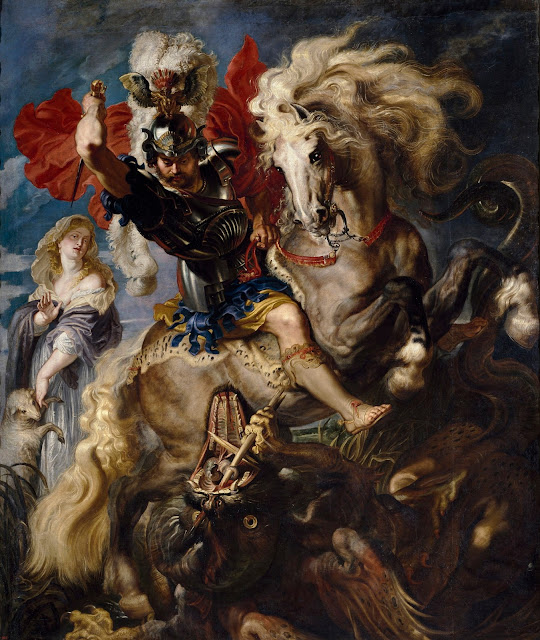 |
| Correggio Jupiter and Io 1531-32 oil on canvas Kunsthistorisches Museum, Vienna |
"Nothing is more contrary to the fact than the supposition that in what we understand by the fine arts, as painting and poetry, relative perfection is only the result of repeated efforts, and that what has been once well done constantly leads to something better. What is mechanical, reducible to rule, or capable of demonstration, is progressive, and admits of gradual improvement: what is not mechanical or definite, but depends on genius, taste, and feeling, very soon becomes stationary or retrograde, and loses more than it gains by transfusion. The contrary opinion is, indeed, a common error, which has grown up, like many others, from transferring an analogy of one kind to something quite distinct, without thinking of the difference in the nature of the things, or attending to the difference of the results."
 |
| Peter Paul Rubens St George and the Dragon ca. 1606-08 oil on canvas Prado, Madrid |
"To use the distinction of a technical philosophy, science depends on the discursive or extensive – art on the intuitive or intensive power of the mind. One chemical or mathematical discovery may be added to another, because the degree and sort of faculty required to apprehend and retain them are in both cases the same; but no one can voluntarily add the colouring of Rubens to the expression of Raphael, till he has the same eye for colour as Rubens, and for expression as Raphael – that is, the most thorough feeling of what is profound in the one, or splendid in the other – of what no rules can teach, nor words convey – and of what the mind must possess within itself, and by a kind of participation with nature, or remain ever destitute of it. Titian and Correggio are the only painters who united to perfect colouring a degree of expression, the one in his portraits, and the other in his histories, all but equal, if not equal, to the highest. But this union of different qualities they had from nature, and not by method. In fact, we judge of science by the number of effects produced – of art by the energy which produces them. The one is knowledge – the other power."
 |
| Raphael The Miraculous Draught of Fishes ca. 1515-16 bodycolor on paper, mounted on canvas Royal Collection, Great Britain |
"The arts of painting and poetry are conversant with the world of thought within us, and with the world of sense without us – with what we know, and see, and feel intimately. They flow from the sacred shrine of our own breasts, and are kindled at the living lamp of nature. The pulse of the passions assuredly beat as high, the depths and soundings of the human heart were as well understood three thousand years ago, as they are at present; the face of nature and "the human face divine," shone as bright then as they have ever done."
 |
| Titian Portrait of Doge Andrea Gritti ca. 1545 oil on canvas National Gallery of Art, Washington DC |
– Why the Fine Arts are not Progressive, from an essay by William Hazlitt first published in The Morning Chronicle, January 11, 1814